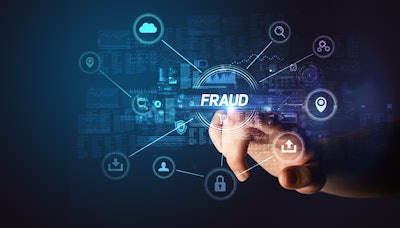
As the Coronavirus disease (COVID-19) lockdowns start to ease, consumer shopping preferences have changed forever. A survey of 1,000 Americans’ shopping behavior during the COVID-19 pandemic saw 88% reporting that their shopping habits had changed due to the pandemic, with 87% now shopping online and 64% replacing traditional weekly shopping trips with online ordering. As this trend continues, retailers are under increasing pressure to get goods to consumers quickly, but also having to address other challenges that come with this New Normal such as fighting mounting friendly fraud. Luckily, thanks to funded biometrically-verified IDs, fraud could become a thing of the past.
Total U.S. online sales reached $73.2 billion in June 2020, up 76.2% year on year when compared with $41.5 billion aggregate from 2019. Yet, a new report from Nexis Lexis shows fraud is costing U.S. merchants more this year than it did in 2019. Every $1 of fraud now costs U.S. retailers $3.36 compared to $3.13 in 2019, and the cost of fraud for online merchants is higher.
While the switch to online shopping acts as a blessing for the e-commerce sector, there's storm gathering behind the silver lining. When first implemented, social distancing measures completely eradicated the need to sign for deliveries. As a result, delivery companies are left with no means of confirming or validating the hand-off, giving rise to a host of bad actors and unscrupulous dealings.
Not-so-friendly fraud
During the COVID-19 lockdowns, one particular type of deception has plagued U.S. retailers and delivery firms alike: friendly fraud.
Friendly fraud isn't as jovial as the name would suggest. Fraudsters use this method to request a chargeback from their bank after taking receipt of the goods and services. According to research, since the onset of COVID-19, friendly fraud now accounts for between 60-80% of all merchant chargebacks.
This type of fraud favors times of economic crisis as people are short of cash and unable to pay for basic amenities. With bills mounting, people may turn to more radical means, such as fraudulently claiming chargebacks on credit cards.
Retailers have minimal means of combating these chargebacks as the customer can go over their head, directly to the card-issuing bank. Friendly fraud isn't always committed on purpose either.
In some cases, such as a failed delivery, recurring payments, or even where the original transaction was carried out by someone other than the cardholder, chargebacks — though possibly misguided — can be legitimate. This blurs the line between genuine and fraudulent chargebacks, which has made the issue troublesome to tackle head-on.
A modern solution to an age-old problem
Retailers often fall back on insurance claims to mitigate the chargeback issue. The problem is, as chargebacks instances rise — and with over 60% being confirmed as fraudulent — insurance claims have become relentless, jacking up the cost of coverage.
Confirmation of receipt has previously acted as a floodgate of sorts. However, since social distancing put an end to signed proof of deliveries that a retailer could request from the courier company, the barrier is no longer there. Even prior to social distancing, physical signing wasn't sufficient. In some instances, packages need no signature at all and often can be signed for by neighbors on the recipients' behalf.
Thanks to unification of technologies, including blockchain for an immutable and secure record of package providence and contactless signing, and biometric verification for indisputable evidence of identity, an airtight confirmation system can be created that not only ensures that packages arrive but one that also combats chargeback fraud head-on.
With this method in place, no longer will bad actors be able to claim non-receipt of a package without just cause.
The extended benefits of biometrics
It's not just friendly fraud that biometrically verified IDs can combat either; identity theft can be almost wholly eradicated too.
According to Javelin's 2020 Identity Fraud Report, criminals are adjusting technology designed to alleviate the risks of identity theft — doing so quicker than consumers can adopt these fraud countermeasures.
The typical SMS-based two-factor-verification and age-old password techniques simply aren't cutting it anymore, and reliance on third-party legacy systems opens up further room for risk. With a biometrically verified ID, however, no one, except the true biological owner, can use it — diminishing even the tiniest attack vector. By harnessing biometrics, we can bypass the need to store passwords with intermediaries, consequently enhancing our security and minimizing the counterpart risk faced by retailers.
To top it off, by embedding biometrically verified IDs with geographic validation encrypted via the blockchain, direct delivery to the person, not just the place, can become a reality.
In April, soon after the Coronavirus lockdowns started, researchers from Citizens Advice revealed that over 28% of people had delivery issues. These issues ranged from late delivery to incorrect tracking information. By May, the problem exacerbated with 1 in 3 consumers reporting issues. To make matters worse, last-mile delivery costs are mounting as a result of this, producing a knock-on effect for retailers and their bottom line.
Instilling a system where a package can be delivered to the person, no matter where they can go some way toward resolving a myriad of delivery issues. And, with blockchain tech already cementing itself as a panacea for a range of supply chain transparency concerns, using it in conjunction with encrypted GPS and user biometrics to solve the last-mile delivery problem seems like a no-brainer.
With any luck, lockdowns and quarantines will soon be a distant memory. But, the habits formed will undoubtedly continue in the long term. To protect ourselves and our businesses, we must adapt to the transition quicker than the fraudsters. Fortunately, biometrically verified IDs give us the edge needed to do so.


















